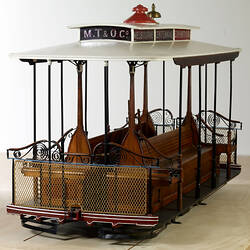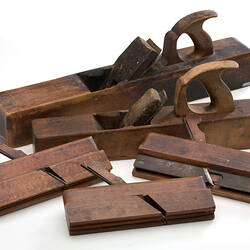Engineering
Significance
Engineering impacts upon everyday life in modern society. It provides the basis for the technology used to provide our transport, power, water supply, sewerage and other services, to construct our buildings and public infrastructure, and to provide much of the food and consumer goods we use throughout our lives.From the 1850s gold rush, Victoria developed a strong engineering industry, manufacturing much of the machinery, goods and transport equipment required by a rapidly developing society. As the state's population has grown, so has the contribution of engineering in developing and maintaining our public infrastructure.
The aim of the Museum's Engineering collection is to document past achievements in Victorian engineering and the impact they have had on everyday life, and to reflect current and future engineering trends within Victoria.
The collection has a strong focus on documenting the changing role of mechanical technology in industry; and the role of invention and innovation in maintaining a vibrant and global competitive engineering and manufacturing industry that is relevant to the needs and aspiration of contemporary Victorians.
Since the early 1980s the collection has focused more closely on engineering within the Victorian context documenting stories of local engineering designs, products and innovations and the local application of technologies developed overseas.
Significant items
- An internationally significant collection of 19th-century mining models and mining hand tools, including ten models by Carl Nordstrom depicting Victorian gold mining techniques of the 1850s and a large range of German mining models depicting techniques from the Hartz Mountains.
- Spotswood Pumping Station: Melbourne's first sewage pumping station is an internationally significant industrial heritage site, which includes buildings and historic precinct, steam pumping engines, electric pumps, and over 1000 associated tools and other historical artefacts.
- 19th century and early 20th century steam engines and internal combustion engines, especially of Victorian manufacture.
- A large collection of steam engines and mechanism models representing technologies dating back to the late 18th century.
- Examples of the work of renowned Melbourne engineer and inventor A. G. M. Michell, including his thrust-bearing (1905), 8-cylinder crankless auto engine (1920-22) and crankless air compressor (1921).
- Significant collection of early electric motors, including Australian-made examples.
- Electric and hydraulic passenger lifts typical of early Melbourne high-rise buildings.
- Pre-20th century lighting technology.
- Examples of Victorian-built machine tools from the late 19th and early 20th centuries, including a steam hammer, steam-powered plate bending rolls, lathes and drilling machines.
- Early Melbourne gas and electric lighting artefacts and over 300 electric lamps.
- Trade tools, including boot and shoe maker, leatherworker, cooper, woodworker, blacksmith, shipwright, organ builder, stonemason, watchmaker.
- Pre-20th century lighting technology, including gas lamps, an arc light and kerosene lamps.
- A significant collection of late 19th century Victorian-made building materials, including bricks and terracotta roofing tiles.
- Extensive photographic and drawing collections from the State Electricity Commission, Esso Australia, Ruston and Hornsby and several prominent Melbourne engineering firms of the late 19th to the mid-20th centuries.

